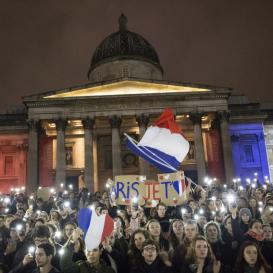I write this on the 14th November, one day after Paris, and the world, was rocked by a terrorist attack that took more lives than we yet know. In the previous few hours and, I imagine, the next few days, a great deal of attention will be given to the events that occurred. The leaders will offer their condemnation, the journalists their sympathy and the snide their contemptuous ‘this was inevitable’. After that, the attention will fade gradually and normal life, like a halted train, will continue along the tracks. The solemn truth though is that normal life will never resume for those touched by the loss of so many innocents. I refer not simply to Paris, for whom the world wept. I refer to Garissa, a faded memory if ever there was one, where 147 Kenyan university students were killed. I refer to Ankara, where 102 died when their rally for peace was bombed by those who lusted for anything but. I refer to the 224 downed from the sky, yet more victims of mindless, indifferent, barbaric, inexplicable terror.
Unfortunately, what unfolded in Paris last night was neither inexplicable nor senseless. If it were a random, isolated event of pure evil incarnate, we’d sleep easier. But it is not. The large and growing number of victims of recent terrorism demonstrate this irrefutably. Terror will not go away if we simply stop thinking about it. I propose then that we do think about it. Before the Iraq war, on the eve of battle, Colonel Tim Collins said this to his battalion: “If there are casualties of war then remember that when they woke up and got dressed in the morning they did not plan to die this day.” In much the same vein, I do not believe that anyone is born wishing to turn their body into shrapnel. It therefore stands to reason that the sense of nobility in martyrdom is instilled at some point between birth and violent death. How, then, does one become radicalised?
I reject the deeply prejudicial suggestion that Islam drives radicalisation. Out of ignorance, many hold the view that all terrorism is Islamic terrorism. This is fundamentally false. There are terrorists of many if not every religious and ethnic background, but terrorism has no religion. Further, and more importantly, Islam is not a pretext for terrorism. Islam is a religion of peace. There are 1.6Bn Muslims globally, and not only are the overwhelming majority peaceful and upstanding people, but they reject and ostracise those who so much as contemplate the merits of terror. Historically, the Islamic world was as peaceful as Europe was tumultuous. A more relevant suggestion might be disenfranchisement. The lives of many of those who have fled their nations to join Da’esh have been characterised by the wilful neglect of the societies they lived in, an almost total failure to be tolerant and accepting. Am I suggesting that not integrating an ethnic group directly leads to their radicalisation? Of course not. But a fatal cocktail of factors, of which disenfranchisement is one, is certainly significant.
I’d contend though that the driving force of radicalisation is violence. Violence is self-perpetuating. Witnessing it normalises it, being the victim of it inspires retaliation. We have all now witnessed the harrowing atrocities in Paris. Will we allow events of this type to become normalised? Will our response be further violence, further escalation? I don’t purport to have the answers to either of those questions. But allow me to try. I think this will happen again. Perhaps it will be in Paris, but it could equally be any city. It could be London. We will recoil in horror, and then slowly resolve to rebuild whatever has been shattered. Yes, to a certain extent, we have become normalised to these attacks. With the passage of time, this will become increasingly true. I think the answer to the second question follows, eerily, from the first. For if we allow ourselves to treat these attacks as normal, then our responses will be normalised. It should not be normal to bomb another country. It should not be normal to launch a drone strike. It should never, ever be normal to take another human life. France has promised ‘merciless retaliation’. Will that be against the militants who we do not yet know with any certainty are responsible, or the civilians who look just like them?
There is real evil in the world. An infinitesimally small proportion of that is those who were broke at birth. The staggering majority is people who’ve been broken. “We are not wholly bad or good”, says Dylan Thomas, in Under Milk Wood. Terrifying as the idea is, within each of us are elements that could have been exploited by circumstance and radicalised by conditions. Equally terrifying is that you or I could have been a victim in Paris. I weep for the victims, who did not wish to die that day. I weep for the perpetrators, who were not born wanting to do this. There is no good or bad here. There is only pain. And we are all a little more broken.
President Hollande declares state of emergency. French army mobilised. Borders closed. #ParisAttacks pic.twitter.com/CS0gOvPTnP
— Sky News (@SkyNews) November 13, 2015









